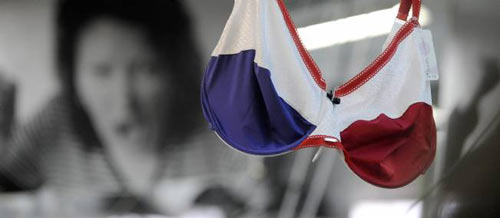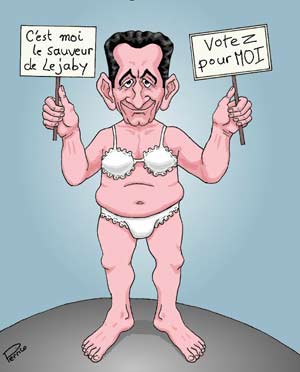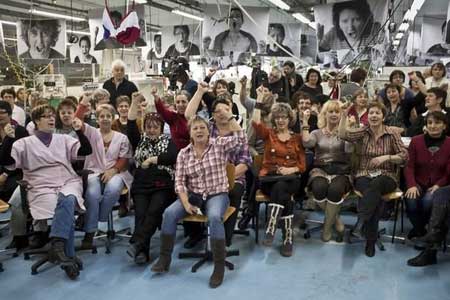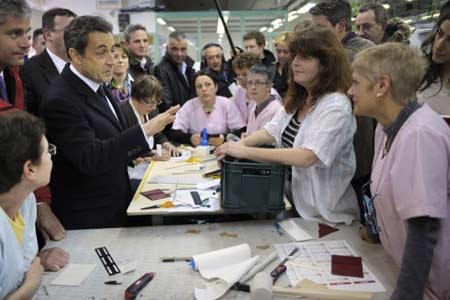A Lingerie Revolution in France

We seldom think of the lingerie industry as a microcosm of the fashion world or of society in general. But in France, at least, it’s both.
A recent poll showed that 91% of French women and 83% of men believe that lingerie is an important part of life and l’amour. But who knew that spirit would spill over into the historic election that returned the Socialists under François Hollande to power this week?
It’s no exaggeration to say that Nicolas Sarkozy, the once-popular French president who was humiliated at the polls, might still be in office if it weren’t for his clumsy handling of women’s lingerie.
No, it wasn’t a Berlusconi-style sex romp that brought Sarkozy down, or trouble in the bedroom with his superstar wife, or something seedier like his rumored manipulation of the Dominic Strauss-Kahn scandal that has captured headlines for the past year.

The chaotic election cycle in France was bursting with issues over the past few months, but perhaps none was as gripping — and as illuminating — as the plight of a small group of women involved in the honorable French tradition of making high-end fashion lingerie.
Earlier this year, the 82-year-old brand Lejaby won court approval to close its last remaining plant in France and move production offshore to Tunisia to cut costs. The decision affected only about 90 employees but, as one newspaper described it, it was “a symbol of all that is wrong with the economy.” And it quickly turned into a media circus and a flashpoint for voter anger as the election neared.
Workers at the rural factory in Yssingeaux — mostly middle-aged seamstresses who would lose their jobs — staged colorful protests outside the doomed plant and at one point brought in mattresses and set up camp on the factory floor.

The situation resonated deeply with anxious voters because it provided a real-life tableau of several grim macro-economic issues afflicting the country. Unemployment was at a 12-year high. Industrial jobs were disappearing rapidly and now accounted for only 12% of jobs nation-wide. The textiles industry, in particular, had been decimated by offshore competition, including the relatively new threats posed by low-cost labor in North Africa, Romania, Croatia and other nearby countries.
Saving Lejaby and its workers became, briefly, a sentimental national cause. The French not only love lingerie, they also take enormous pride in the country’s longtime international reputation for producing sublimely artistic undies. Although most leading lingerie labels now manufacture elsewhere — in fact, only 5% of clothes now sold in France are made there — the exodus of Lejaby represented one more blow to national pride.
It also provided campaign fodder for politicians. As the Lejaby protests played out on TV news shows nightly, the Socialists visited the picket line and promised (somewhat vaguely) to find a way to save workers’ jobs. But Sarkozy had something else in mind.

Visiting the Lejaby factory in March, the president announced triumphantly that he had helped negotiate the sale of the plant to LVMH Moet Hennessey, owners of the iconic Louis Vuitton brand, which is owned by Sarkozy’s friend Bernard Arnault. “You have left your troubles behind,” Sarkozy told the workers, who will now be retrained to make leather goods instead of underwear.
Ah, if it were only that simple. Instead, many voters saw Sarkozy’s intervention as nothing more than opportunistic cronyism — a one-off favor that could hardly be counted on to breathe new life into France’s shriveling industrial base.
Both Sarkozy and his rival Hollande advocated more protectionist policies aimed at saving French jobs, including a new “Made in France” buying policy and trade platform that sent shivers through the Eurozone. Protectionism has an undeniable patriotic appeal, but during an election campaign it can come across as desperate pandering. For Sarkozy, it was too little too late.
And his fate should make other political leaders in both Europe and North America pay close attention to other Lejaby stories unfolding in their own backyards. Industrial nations around the world are in the throes (and in many cases at the end) of a massive global shift in labor and capital that threatens to undermine national economies and, as in France’s case, eat into the national psyche.
Sarkozy at least made one meaningful gesture in his flailing campaign, although the symbolism was ultimately ironic.
Along with their campaign rivals, Sarkozy’s party purchased thousands of campaign T-shirts from French manufacturers to drive home the “Made In France” message. They cost 3 to 5 times the price of similar goods made and shipped from China.
Read Richard Vincente’s columns daily at LingerieTalk.com

